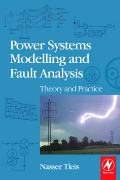Power Systems Modelling and Fault Analysis - Elsevier

This book provides a comprehensive practical treatment of the modelling of electrical power systems, and the theory and practice of fault analysis of power systems covering detailed and advanced theories as well as modern industry practices.
The continuity and quality of electricity delivered safely and economically by today�s and future�s electrical power networks are important for both developed and developing economies. The correct modelling of power system equipment and correct fault analysis of electrical networks are pre-requisite to ensuring safety and they play a critical role in the identification of economic network investments. Environmental and economic factors require engineers to maximise the use of existing assets which in turn require accurate modelling and analysis techniques. The technology described in this book will always be required for the safe and economic design and operation of electrical power systems.
The book describes relevant advances in industry such as in the areas of international standards developments, emerging new generation technologies such as wind turbine generators, fault current limiters, multi-phase fault analysis, measurement of equipment parameters, probabilistic short-circuit analysis and electrical interference.
Click here for further information
Terms
While we only use edited and approved content for Azthena
answers, it may on occasions provide incorrect responses.
Please confirm any data provided with the related suppliers or
authors. We do not provide medical advice, if you search for
medical information you must always consult a medical
professional before acting on any information provided.
Your questions, but not your email details will be shared with
OpenAI and retained for 30 days in accordance with their
privacy principles.
Please do not ask questions that use sensitive or confidential
information.
Read the full Terms & Conditions.